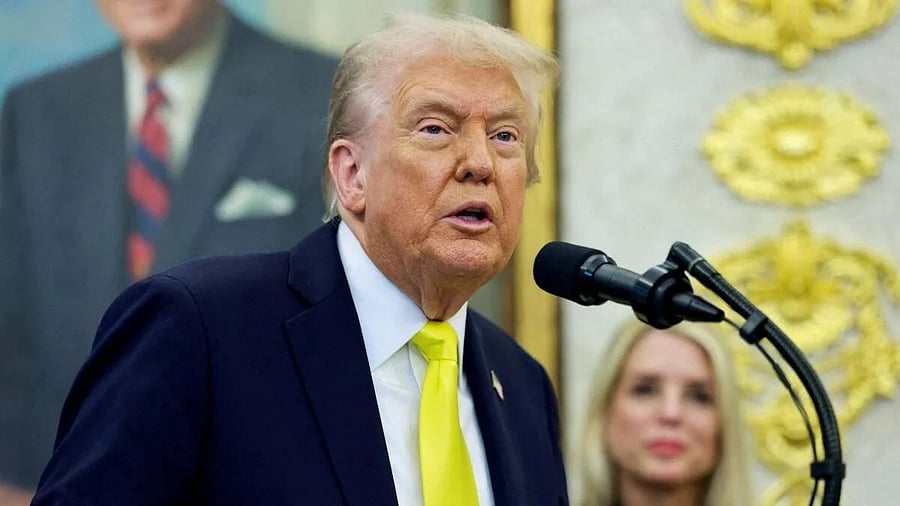
US President Donald Trump.
Credit: Reuters File Photo
President Donald Trump said he would immediately halt all trade negotiations with Canada, citing a Canadian advertisement against his signature tariffs plan featuring the voice of former President Ronald Reagan.
“TARIFFS ARE VERY IMPORTANT TO THE NATIONAL SECURITY, AND ECONOMY, OF THE U.S.A.,” Trump wrote on his Truth Social platform. “Based on their egregious behavior, ALL TRADE NEGOTIATIONS WITH CANADA ARE HEREBY TERMINATED.”
The ad in question comprises excerpts from an address Reagan gave in 1987 in which he defended the principles of free trade and slammed tariffs as an outdated idea that stifles innovation, drives up prices and hurts US workers.
Funded by the government of Ontario, the ad seeks to sow doubt among Republican voters by using one of the party’s most iconic voices.
Trump, however, said the move appears timed to interfere with a looming Supreme Court case challenging the legality of much of his signature foreign economic policy. The president has warned of disaster if the high court overturns his country-based tariffs, including forcing the government to refund companies billions of dollars in already-paid duties.
The court is scheduled to hear oral arguments in the case on Nov. 5.
The Ronald Reagan Presidential Foundation and Institute had criticized Ontario for running the ad, saying that they didn’t seek permission to use the remarks, and that “selective audio and video” in the ad “misrepresents” Reagan’s full address.
The remarks from Reagan backed his decision to tariff Japanese imports, while defending free trade and warning of the long-term effects from tariffs.
Trump’s anger over the ad continued into Friday morning with a new series of Truth Social posts. “Canada is trying to illegally influence the United States Supreme Court in one of the most important rulings in the history of our Country,” he wrote in one.
There is no evidence that the ad violated any laws.
Earlier: Carney Sets Goal of Doubling Canada’s Non-US Exports by 2035
Canada’s economy has been badly damaged by Trump’s tariffs, as about three-quarters of its exported goods went to the US last year. Ontario, which has about 16 million people, has been at the center of the trade war because it’s the heart of Canada’s steel and automotive industries, two sectors in which Trump has hit foreign producers. Canada is the second-largest trading partner for the US.
The announcement injected fresh uncertainty into one of the world’s largest bilateral trading relationships. The US and Canada exchanged more than $900 billion in goods and services last year. The Canadian dollar edged lower on Trump’s comments.
The White House didn’t immediately respond to a request for further details. The offices of the Canadian prime minister and Ontario premier didn’t respond to requests for comment made after normal business hours.
Officials from both countries have been engaged in lengthy talks for months, most recently focused on steel and aluminum tariffs, with the Carney administration pressing the case that lowering tariffs on the metals would help the US advanced manufacturing sector.
Trump and Canadian Prime Minister Mark Carney are likely to see each other next week, as both will be attending the Asean and APEC summits in Malaysia and South Korea, respectively.
Since returning to office, the president has taken an unconventional approach to trade, often announcing the imposition or removal of tariffs and trade deals with allies and adversaries alike on his Truth Social platform. His decisions often hinge on countries’ political stances or economic policies.
“Markets have seen this movie before — Trump’s trade brinkmanship rarely lasts,” said Charu Chanana, a strategist at Saxo Capital Markets in Singapore. “Any loonie weakness may be faded quickly unless we see follow-through on tariffs or new rhetoric escalation.”
Indeed, this is not the first time this year that Trump has said he’d cut off trade talks with Canada. Earlier this summer, the president said he was terminating all trade discussions with Canada because of its Digital Services Tax, and that he would announce new tariffs on the country.
It proved an effective strategy for the president at the time. Canada said it would introduce legislation to remove the tax and halt collections, reopening communication channels.